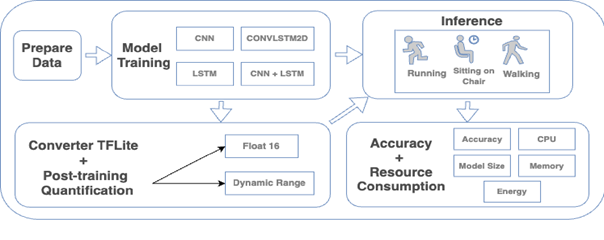Resource-Efficient Deep Learning for Mobile Activity Recognition on Edge Devices

Introduction
The growing prevalence of mobile devices equipped with motion sensors, such as accelerometers and gyroscopes, has opened doors for innovative applications in health monitoring, fitness tracking, and human-computer interaction. A key area lies in activity recognition, where the device can identify a user's physical activity (walking, running, sleeping, etc.) based on sensor data.
However, traditional deep learning (DL) models often struggle on resource-constrained mobile devices due to limitations in computation power, storage, and battery life. This project aims to bridge this gap by transforming deep learning models for resource-efficient activity recognition on mobile devices.
Task
The aim is to investigate existing deep learning models (particularly DeepConvLSTM, MobileNet, SqueezeNet) for activity recognition. You are expected to optimize these models using techniques such as quantization that reduce their computational complexity and memory footprint, while maintaining accuracy. Then, the aim is to deploy the optimized models on an Android device or a Raspberry Pi platform and evaluate and compare the performance of the original and optimized models in terms of metrics such as accuracy, model size, resource usage.
Multiple students are accepted.
Work
30% Theory, 50% Programming, 20% Writing
Contact
Özlem Durmaz İncel, Associate Professor, Pervasive Systems (ozlem.durmaz@utwente.nl)
